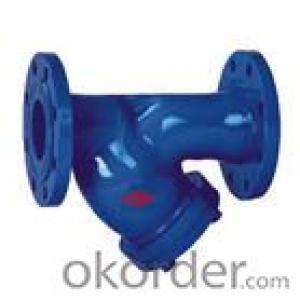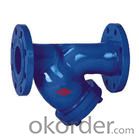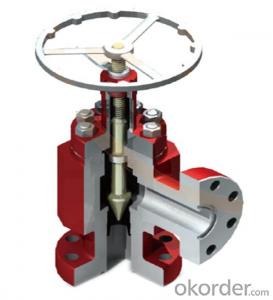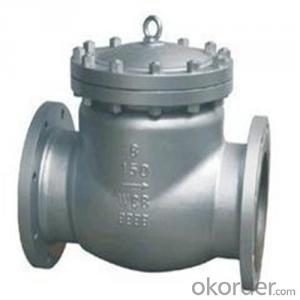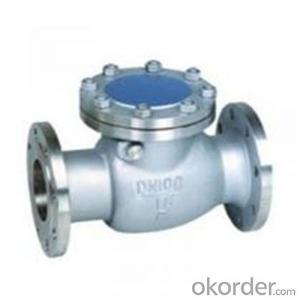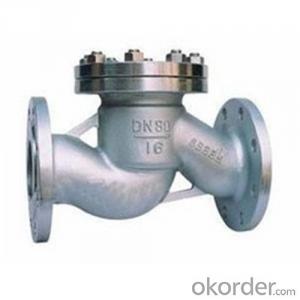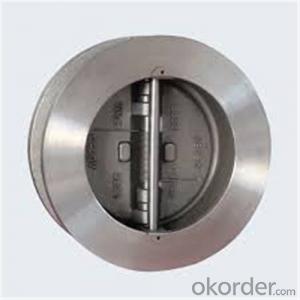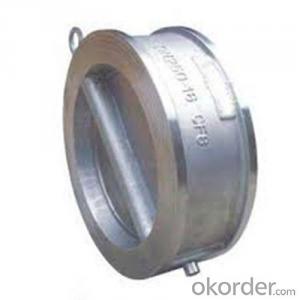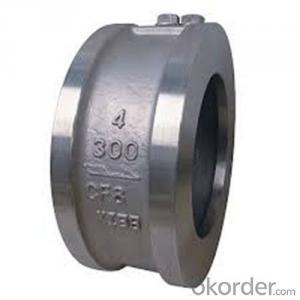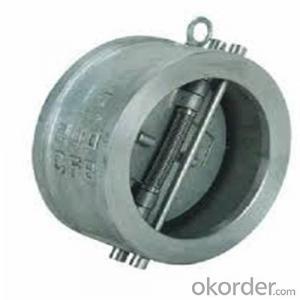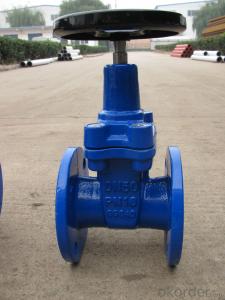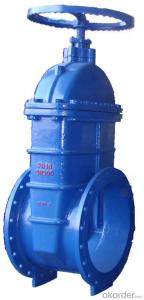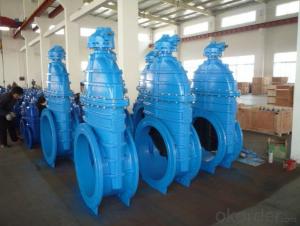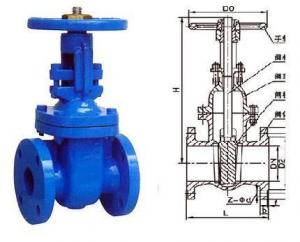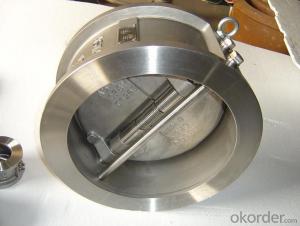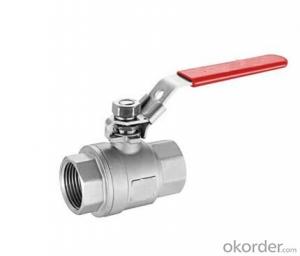DCI Y-Strainer with stainless steel mesh
- Loading Port:
- China Main Port
- Payment Terms:
- TT OR LC
- Min Order Qty:
- -
- Supply Capability:
- -
OKorder Service Pledge
OKorder Financial Service
You Might Also Like
Specifications
Double flanged Double Eccentric Butterfly Valve
PN10/16/25
DN100 ~ DN2000
Technical Specifications
- Design and manufacture: EN593, EN1074-1 and 2
- Face to face dimension: EN558-1 Series 14 (DIN3202 F4)
EN558-1 Series 13 (BS5163)
- Flange dimensions and drillling: EN1092-2 PN10/16/25
- Size range: DN100 - DN2000
- Max. working pressure: 1.0/1.6/2.5 MPa
- Inspection test: EN12266
- Working temperature: -15°C to +80°C
- Suitable medium: water
Main Fetures
- Double eccentric disc reduces seal wear and torque
- Body seat ring is welded directly on the body
- Bi-directional flow and low head loss
- Disc sealing ring to be replaceable on pipeline without dismantling the valve
- Body and disc inside and outside epoxy powder coated (min. 250 microns)
- Opening and closing indicators are provided
- Coupling flange for electric actuator in compliance with ISO5211
- Gearbox and electric actuator operation available
Main Parts and Materials
Body and disc: ductile iron EN GJS500-7/400-15
Shafts: stainless steel AISI 420
Body seat ring: stainless steel AISI 304
Disc sealing ring: EPDM or NBR
Retaining ring: stainless steel or ductile iron
Shaft bearing: Du bushes (self lubricating bushes)
- Q: when there is fire in the building, the solenoid valve is activated but what happen inside the cylinder actally?
- If the pressure in any one zone is different than the other zones it could be one of two reasons; either the pressure is high (usually due to one or more sprinkler heads not poping up), or its low (usually due to a leak in the pipes). Something that could cause low pressure in all the zones are an obstruction in the water line above the valves (unlikely), or a hole in the line above the valve (the water would be filling the valve box and causing damage to the lawn wherever it is located), or leaks in all the lines (again would be easy to identify from the excess water in the ground at the source of the leak). Lastly the valve itself could potentially be faulty. The solenoid inside the valve holds the valve open when electricity is applied across it. If the wires to it are damaged; if the solenoid is bad; or if the valve has any rust or dirt inside that could cause a lower than normal amount of water flow.
- Q: I just installed three anti-siphon valves(jar top,orbit) for a sprinkler system the main water line is 3/4 then goes into my manifold (pvc)3/4 schedule 40,usually when you turn on the water it comes to a stop where you re valves begin then you either open them manually or their set up through you re timer, the problem im having when i open the main water line the water goes straight through the valves without me even opening them my question is can it be to much pressure or what can the problem be? any info helps thank you
- There's a small button on top of the elec valve, which is a manual override. Find it, and be sure it's turned all the way to the right, like tightening the cap on a bottle. This closes the override but doesn't affect the solenoid operation. If this isn't the problem, disconnect the control box from power, and see if the valves now are closed. Might be wired wrong, and the solenoids are stuck open because of always being powered. Too much pressure isn't the problem -- when a home is built in a place with abnormally high water pressure, pressure reducers are installed to diminish the pressure to workable levels.
- Q: my valves got dirty long story how do you clean them
- Remove the valves, wash them and the horn in warm (NOT hot) water with liquid dish soap. Dry with a clean towel, then oil and reassemble.
- Q: I want to reduce the prssure of a liquid flow (ethanol) from 16.7 atm to 1.2 atm? Do I need more than one valve?
- One control valve can reduce pressure, as long as there is always a significant flow through it. The main reason for using more than one valve is usually to reduce or prevent cavitation caused by a large pressure change through a given valve. Ethanol has a pretty high vapor pressure, so cavitation might be a problem. Control valve manufacturers usually provide design guides for their valve trim choices (often in software form) that lead you through the choices and requirements. Each valve design has different limits. But, my seat of the pants feel is that you can do this with one valve. I have included an example. I am not specifically recommending this company. -- Regards, John Popelish
- Q: what are the factors should be know to select a control valve for specified application
- There are numerous articles online that address this question from choosing the correct size to the correct actuator. Here are just a few:
- Q: I have a 40 year old Holton Bb trumpet. It plays fine except the first valve always gets stuck when I play it, in the middle of a song it won't come back up. I can pull it back up and it doesn't get stuck real bad, but how can I fix this? I always oil it properly and insert the valves right. Do I have to replace it? Thanks
- You need not replace the valve, but it does need a bit of attention. There are many possible reasons for the sticking and you can spend a long time trying to chase them down. Inconsistent sticking suggests 2 likely reasons (there are several more possible reasons). The first is piston wear that has slightly misshapen the valve casing so it sticks because it doesn't travel through the valve casing exactly the same way every time. The second is that the felts and corks are worn and need to be replaced. The best thing for you to do is to take it to a shop, describe the problem and spend a few bucks to get it fixed right.
- Q: I've never replaced a shut off valve before but am wondering if there are any tricks in freeing up a stuck valve that wont close. Can this be done so I don't have to call anybody?
- turn off water to house, if your valve has a nut behind handle that has threads on inside of nut ie brasscraft style, you can go to store and buy new valve and replace stem. If pipe comes out of wall (angle stop) get that one, if comes out of floor (straight stop) get that one. remove new stem and old stem and switch. If nut behind handle has threads on outside of nut, then you must replace valve. ( you have to remove nut to see where threads are ( i don't but you might) depending on what type of pipe you have is what new valve you will need and also how close to wall or floor is how to attack problem tre..706yahoo 4 any more help
- Q: Is it hereditary? My dad had a bicuspid valve and we got told it was hereditary but some doctors say it's not, my parents wanted to get me tested in case i had it so we would know in advance but the doctors here refuse to do it (I live in England if that makes a difference) my dad said he would pay to go private if it's hereditary. I know someone who had a bicuspid valve and 3 out of her 4 children inherited it, i know it's pretty harmless until i reach an older age but my parents and i would like to know now, i'm 13 by the way.=]
- I am not sure you and your father want to know if this is hereditary. If you have say have a bicuspid valve now it is not going change any thing. You will still have norma life There are many like living normally
- Q: My husband just found out that one of the heart valves is 100% blocked and the other 3 are 90% or more blocked . He is 78 years old he Is nearly non mobile. What kind of treatment would you suggest?
- A heart valve can't be 100% blocked. The heart simply couldn't function. On the other hand, coronary arteries can be blocked as you described. Normally, 4 vessel disease is treated with bypass surgery. In a high risk patient, angioplasty might be an option. However, if he is not having cardiac symptoms , or if he is thought to be TOO high risk, the option is medical treatment. Sit down for a talk with his cardiologist.
- Q: What do I do to make my valves stop ticking? And what makes them tick? its a 94 Acura Integra with a 91 LS motor, 105,000 miles. If I get a new engine head will it stop ticking or the ticking has to do with the block?
- Just have the valves checked. They may be adjustable on that car. No, don't buy a head. It could be low oil pressure, blocked oil gallery, worn guides. Just get it checked out. At that mileage, I would not spend a lot of money on it. Just wait until you get a new car or get a whole engine rebuild. You may be able to drive it as is for another 100,000 miles.
Send your message to us
DCI Y-Strainer with stainless steel mesh
- Loading Port:
- China Main Port
- Payment Terms:
- TT OR LC
- Min Order Qty:
- -
- Supply Capability:
- -
OKorder Service Pledge
OKorder Financial Service
Similar products
Hot products
Hot Searches
Related keywords
